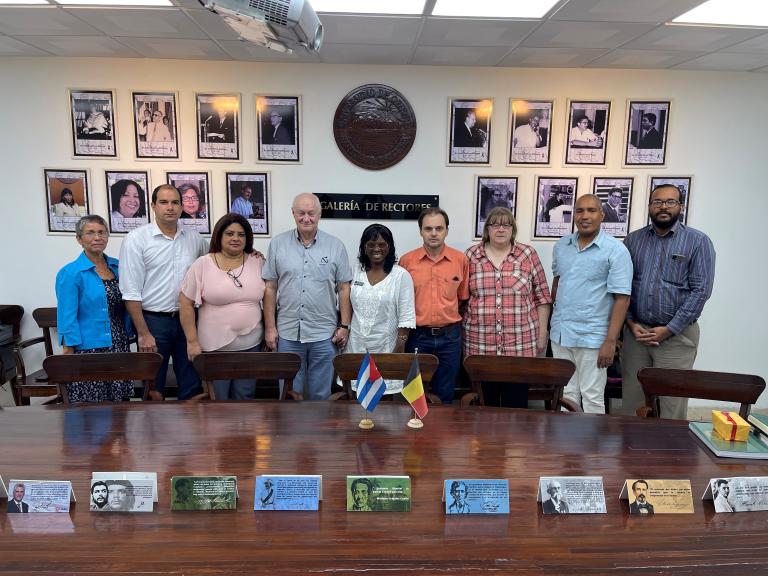-
Last updated on

Some of the satisfied participants in the formation at the presentation of the certificate. © Egmont Institute
With financial support from our FPS, the Egmont Institute organised a training programme for 10 women from Niger in senior management positions within various ministries. The training will enable them to be an even stronger role model to convince women in Niger to step out of their comfort zone and realise their goals.
The Sahel is a much-troubled region. Not only is it severely affected by climate change, but several armed groups are also active there and are seeking to destabilise the region.
Belgium remains firmly on the side of the Sahel countries. With that in mind, our country is providing military and development cooperation to Niger, Mali and Burkina Faso. We are also helping to build the Great Green Wall.
In conversation with Minister Lahbib
In February 2023, Belgium completed a training programme for 10 women in Niger who hold senior management positions within various ministries. Participants included the Deputy Secretary General of the Ministry of Mines, the Deputy Director of the National Gendarmerie (Ministry of Defence) and the National Director of Environmental and Social Inspections (Ministry of Environment).
The women followed 5 modules, each of which lasted 4 days. The modules focused specifically on leadership, policy analysis & evaluation, negotiation & mediation, ethics & integrity and communication & advocacy. Coaches from Niger also provided them with 5 half days of coaching.
By means of videoconferencing, they were able to have an informal conversation lasting about an hour with 5 Belgian women in leadership roles. Among them was none other than Belgium's Minister of Foreign Affairs Hadja Lahbib and Heidy Rombouts, the Director General of our Development Cooperation Department.
Handling disputes more effectively
The participants turned out to be extremely satisfied. ‘The training was very useful for my personal development,’ says Ramatou Bagoudou, the Head of Administrative Affairs at the Ministry of Petroleum. ‘Thanks to the training, I have now mastered some very practical tools, such as negotiating and public speaking.’
As Rayanatou Aboubacar Hamidou – Director of Architecture at the Ministry of Urban Planning and Housing – points out, all of the modules have firmly boosted her leadership. ‘I now have a better knowledge about how to handle disputes among my employees,’ she says. ‘It is essential to be impartial and actively listen before judging and making a decision.’
The situation of women is similar everywhere
The training will certainly boost their careers and in many cases, the women are dreaming big. ‘Becoming a minister or the speaker in parliament, why not?’ says Bagoudou, laughing. ‘I set my goals and then take a step back in order to achieve them.‘
One thing that the participants took away with them from their conversations with the Belgian women in leadership roles is that the situation of women is essentially very similar everywhere. It turns out that there is a long historical tradition that is virtually universal. ‘Women everywhere should be encouraged to step out of their comfort zone,’ observes Aboubacar. ‘They must have the courage to achieve their goals.’
‘All of you can do it too’
Training programmes of this type are more than simply useful and necessary. In Niger, there are still many girls who do not go to school and gender equality is still a distant dream. ‘There are still too few women in positions of responsibility, even though quotas have been laid down by law,’ says Aboubacar. 'The quotas are simply being disregarded. Look at our country's parliament, for example.’
The group of 10 women in leadership positions are therefore rather eager to act as role models for girls and women in Niger and this training programme has contributed greatly to that. They want to convincingly convey the message that every woman in Niger can make it too. ‘If we could accomplish it, then all of you can do it too.’
A joint project
Each of the women feels that the training could have lasted longer. The participants have developed themselves a joint project to further enhance the role of women leaders – within the public services but also within the Ministries of Defence and Security. Belgium's ambassador to Niger, Myriam Bacquelaine, is pleased with this initiative. ‘I want to invite them to the residency to launch their group initiative,’ she said. ‘And I would also like to include the 3 female ministers under whose tutelage they work.’
In Bacquelaine's view, training courses of this type are essential. ‘Women account for more than half of all societies. They should no longer be left sitting with their arms crossed. Each person must be able to play his/her part. In that regard, it's worth noting that Belgium still has few female ambassadors. And women are definitely not taking up positions held by men, as people often say to me. It is the men who for generations have held the positions that are women's birthright.’
The Egmont Institute organised the training and the budget came from the FPS Foreign Affairs' budget line ‘Strengthening Belgium's image’. As the pilot project in Niger proved so successful, work is now under way to develop a new training course, possibly in Senegal.
More on People

The healing power of medicinal plants borne out in Vietnam is confirmed
In tandem with Hanoi University, Prof. Muller (ULiège) has scientifically examined the ancient knowledge on medicinal plants in ...

The Met returns precious medieval charter to Belgium
On January 26, 2023, the Metropolitan Museum of Art (New York) returned a unique charter of Philip of Alsace, Count of Flanders ...

VLIR-UOS makes universities in the South perform better
Long-term collaboration by Flemish universities with a university from a poorer country is a real formula for success. As a resu...
